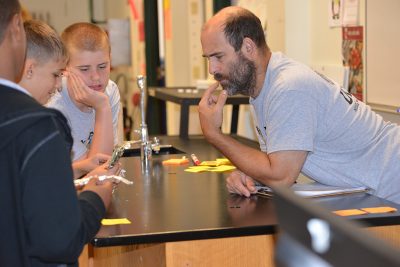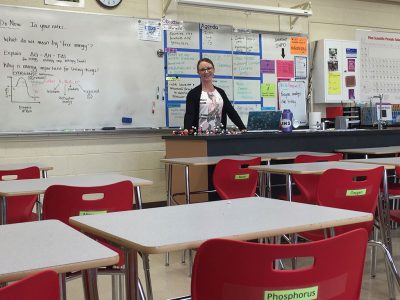Arthur Lerner did not see a career as a teacher in his future — that is, until a newspaper article about a teaching program offered by UConn’s Neag School of Education caught his eye.
Founder of Connecticut-based nonprofit FRESH (Food: Resources, Education, Security, Health) New London, Lerner has long pursued a mission of educating the community — principally children and senior citizens — about healthy food. With New London among the lowest-ranked towns in Connecticut in terms of food security[1], the organization developed out of an effort to help bridge the gap between low-income community members and access to local, healthful, and sustainable foods.
Lerner says he has always lived with a passion for nature and sustainability. After founding FRESH New London in 2004 and working there for more than 10 years, he was ready to try similar work, but in a different capacity.

The Neag School’s Teacher Certification Program for College Graduates (TCPCG) seemed a perfect fit — in addition to offering extraordinary financial support. The 11-month program, in which students earn a master’s degree in education as well as teaching certification, was awarded a $1.2 million grant last year to sponsor aspiring teachers at UConn’s Avery Point campus — an average of six future teachers per year for four years. The grant, known as the Robert Noyce Teacher Scholarship, is funded by the National Science Foundation and was created to provide higher education institutions nationwide with scholarship funding and other financial support for aspiring science, technology, engineering and math (STEM) teachers.
Thanks to his $30,000 Noyce grant, 43-year-old Lerner is now advancing his education through TCPCG at the Avery Point campus. The scholarship is helping to create a smooth transition for him as he goes from nonprofit work to pursuing a career as a biology teacher.
“I was doing informal education [with FRESH], and now I’m doing formal education,” Lerner says.
TCPCG encourages master’s candidates who have an undergraduate degree in a STEM field and who plan to study at the Avery Point campus to apply for the grant upon acceptance to the program. It is an accelerated program in which candidates earn both a STEM teaching certification and master’s degree in curriculum and instruction. Students from nontraditional backgrounds are encouraged to apply. Completion of the program with the Noyce scholarship requires a two-year commitment to teaching at a high-needs school after the 11-month program, an aspect that Lerner found especially appealing.
“I’m into helping marginalized communities,” Lerner says. “It was serendipity to me; it also has a philosophy that fits me.”
“When you find a way to connect, that’s what teaching is there for, and it’s empowering and beautiful.” Arthur Lerner, Noyce Scholar and current student in the Neag School’s Teacher Certification Program for College Graduates
Like-Minded People
TCPCG alumna Beth Raynor ’11 MA, also a Noyce Scholar and today a biology teacher at Manchester High, majored in art history and minored in biology during her undergraduate years at Wheaton College. After spending a few years working in the different art fields and curating art galleries, Raynor realized that she missed the field of science.
Raynor found the TCPCG program online while working to get another undergraduate degree in biology at UConn. For her, obtaining a master’s degree in curriculum and instruction, along with a STEM teaching certificate, in less than one year was the right fit, as opposed to seeking to complete the degree and earn certification separately over time. The strong sense of camaraderie between students in the program and their teachers and mentors was another powerful aspect of the program for her.
“Finding like-minded people was the main thing that helped me get through it,” Raynor says. “I truly believe that TCPCG has great faculty and staff that taught me everything I needed to know.”
The TCPCG curriculum is divided into three parts: The first part is 12 weeks of coursework in the classroom, completing state requirements for becoming a STEM teacher; the second part centers on student teaching at a nearby school district; and the third part involves students firsthand in research focused on improving some aspect of a school, as well additional coursework on campus.
Raynor’s passion for helping students in high-needs school districts was another key factor in joining the program. TCPCG, she says, is “putting people who are extremely well educated and who are driven and passionate about what they do in these schools. We’re really targeting a need that hasn’t been addressed up until now, and I think that’s really effective.”
‘Empowering and Beautiful’
According to Neag School Professor John Settlage, the TCPCG site director at UConn’s Avery Point campus, the student teaching experience during the second part of the program tends to focus, at first, on mentoring. In order to gain exposure before student teaching begins in earnest, TCPCG students teach at a middle school science camp for a week before going into the traditional classroom. They then gradually transition from mentoring and watching the classroom teacher lead the lesson to taking over their roles, from writing tests to running parent-teacher conferences, Settlage says.
“Student teaching is the hardest part, because you’re not permanent, so everything is off-balance,” Lerner says. But “I gave my students a [Neil deGrasse Tyson] video to watch for homework, and when they came in, they all had done it. When you find a way to connect, that’s what teaching is there for, and it’s empowering and beautiful.”

Connecticut requires teachers to get a master’s degree within five years of getting certified; TCPCG takes care of all that, Settlage says. “It’s a combination of being very rigorous and very practical,” he says. “The more we blend those, the better.”
The program is rigorous in learning and practical in applying, Settlage says. After intense classroom work, students get the opportunity to apply that knowledge before embarking on their teaching career.
Raynor says she found that, after completing TCPCG, she was not only able to compete for job interviews, but also seemed to have a less difficult transition to becoming a teacher than some of her peers who had not gone through such a program. “My first year of teaching was hard, but it wasn’t as hard as other people I’ve talked to,” she says.
For aspiring teachers looking to go into the STEM field, Settlage thinks of Connecticut as a playground of career options, particularly, he adds, given that not many other competing schools of education in the region are focused specifically on STEM education.
“Be prepared to work; be prepared to question yourself and your previous knowledge of what education is,” Raynor says. “I can’t speak highly enough about this program. You really will probably be among the top prepared teachers in the country.”
Learn more about the Teacher Certification Program for College Graduates at Avery Point and Robert Noyce Teacher Scholarship here.
[1] According to a joint report by the Connecticut Food Policy Council, University of Connecticut, and Hartford Food System
 Facebook
Facebook
 Twitter
Twitter
 LinkedIn
LinkedIn
